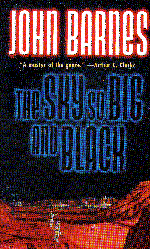|
The Sky So Big And Black
Copyright 2002 by
I first read this on the 1st February 2004. The artificial consciousness "One True" rules Earth, having infected all earthbound populations with its agent, the Resuna virus. Off Earth, human culture continues to develop whilst maintaining massive defenses against the frequent incursions of the Resuna virus. On Mars, Terpsichore Melpomene Murray is a fifteen-year old girl trying very hard to be an adult. She thought she was going to be an ecospecter like her father, exploring Mars and helping in its terraforming. She thought she was getting married to Perry, another ecospecter. She had it all planned out. Now however, Perry shows something of a lack of interest in the forthcoming marriage. Her father is suggesting further schooling and additionally recommending that she delay taking her "Full Adult" examination for one more year. Trials and tribulations indeed, but we know that what is going to happen to Teri is much worse than this. We know because we follow her story as a series of tapes being viewed by her police psychiatrist. First of all one thinks that this is just another novel about the journey to adulthood, of a young girl overcoming trauma and coming of age. Then one realizes that this must have been a pretty grievous trauma. Even so. come on, John Barnes did this already with another Melpomene in "Orbital Resonance". The guy clearly knows how to write about teenage girls. There are also echoes of Frederick Pohl's Robinette Broadhead, of "Gateway" fame, conversing with his psychiatrist. Once we are finally accustomed to watching Teri-Mel's trials at secondhand, Barnes shifts the action more directly to the psychiatrist. This doesn't seem such a good idea because the morose and alcoholic head-doctor is no match for Teri-Mel's vivacity and startling competence. Of course, we're wrong (well, more specifically I was wrong) for the story is only just starting. At this point you're reading the book with the dread intuition that it is going to metamorphose into a variant of "Flowers For Algernon" (and I couldn't handle two of those this month - see the review of Elizabeth Moon's "The Speed Of Dark"). However, Barnes still has surprises to spring. It is a very impressive book. Barnes succeeds on many levels. He manages to satisfyingly continue his "One True" and "Resona" themes from earlier novels. He creates an the exciting Martian culture of the rounditachi (nice borrowing from the Japanese, that) as Mars undergoes terraforming. He has created a vision of the future where the education system really works and he makes you wish you had gone through that rather than interminable lessons from bored teachers. He has created the enthralling character of Teri-Mel, and did pretty well on her father, and the tragic psychiatrist. It is very good. Loaded on the 29th February 2004.
|
|






